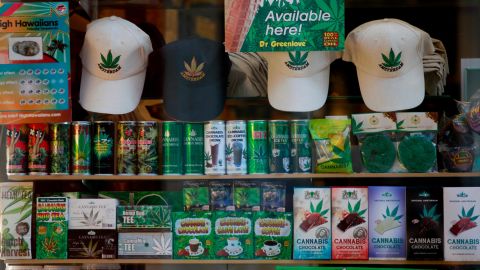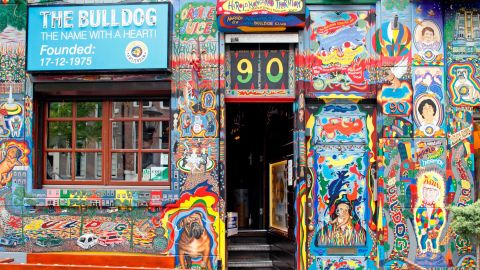Amsterdam
CNN
—
As soon as crowded by too many vacationers, the canals of Amsterdam proceed to face empty, even because the Netherlands eases journey restrictions. The notorious Crimson Mild District can be largely abandoned. The Dutch capital stays a ghost city.
However what of that different well-known Amsterdam establishment? How have the town’s cannabis-vending espresso retailers fared throughout these troubled instances? Starved of out-of-town guests, many who flocked to the town simply to benefit from liberal drug legal guidelines, have they survived?
And, in a world of face masks and issues over indoor exhalations, have they even been permitted to stay open?
In reality, Dutch espresso retailers by no means closed utterly through the pandemic as they have been classed as important companies, in contrast to eating places, cafes and nightclubs.
However the hashish cafes have been dealt a catastrophic blow resulting from an absence of the worldwide vacationers who have been liable for a big share of their income. And whereas some have tailored to a brand new lifestyle, there are fears from those that work in them that they’re in peril of vanishing.
“For enterprise it’s been devastating,” says Nick, a employee on the metropolis middle Otherside espresso store who didn’t wish to give his surname for causes of privateness.
Pre-pandemic, the cafe was often full through the week, noisy and buzzing with environment as folks socialized with one another whereas smoking a marijuana cigarette or consuming a hashish brownie. however on a Thursday afternoon in early February, there’s only one particular person sitting inside, engaged on a laptop computer whereas sipping a cup of espresso and smoking a hashish joint.
“In my espresso store it’s been very empty and boring,” says Nick. “However different espresso retailers [outside the center] are busier than ever resulting from takeaway demand. Throughout coronavirus, everyone is sitting at house and smoking.”

Over half of the capital’s 167 espresso retailers are within the middle and closely reliant on tourism, says Joachim Helms of the espresso store house owners’ affiliation BCD.
“The espresso retailers within the middle have been actually in survival mode [during the past two years],” he says. Authorities monetary help allowed them to remain afloat, however this solely lined their hire and furlough for employees, they usually struggled to make any income, Helms says.
When coronavirus overwhelmed Europe in March 2020, the Dutch authorities introduced a strict lockdown and ordered all hospitality to shut, together with espresso retailers. This resolution was reversed virtually instantly after folks began shopping for hashish illegally.
“The federal government apprehensive that in the event that they saved the espresso retailers closed, folks would flip to the streets and unlawful sellers,” says Helms. The retailers have been allowed to remain open, even through the strictest lockdowns, for takeaway service.
The pandemic has highlighted that it’s primarily vacationers who eat hashish in espresso retailers; locals have a tendency to gather it and smoke the drug elsewhere. Whereas the cafes have remained largely empty over the previous two years, demand for hashish has surged and takeaway gross sales have elevated considerably.
“In residential areas enterprise has been particularly good,” says Helms. “Particularly originally of the pandemic, when folks have been stockpiling [cannabis] in case espresso retailers closed throughout a lockdown.”
In a survey by Trimbos, a Dutch psychological well being and dependancy analysis institute, 41% of 1,563 respondents mentioned they have been utilizing hashish extra because the begin of the coronavirus pandemic. Practically half – 49% – mentioned they have been smoking as a lot as earlier than. Three-quarters used hashish virtually every day after the federal government launched lockdown measures. The principle causes for utilizing hashish extra have been boredom, stress and loneliness. Some 75% have been smoking on daily basis.
“The takeaway enterprise has been actually good,” says Maeve Larkin, who works in Hunters espresso store within the middle. “Individuals have a tendency to purchase larger quantities [than when they consume it in the cafe].”

Though the lockdown has ended, strict guidelines stay in place for your entire Dutch hospitality sector. All clients should present a vaccination cross, within the type of a QR code on their telephones, to purchase hashish in a espresso store, preserve a 1.5-meter distance whereas inside and put on masks whereas ordering. Espresso retailers should cease serving at 10 p.m., however are allowed to remain open till midnight for takeout.
These guidelines make it troublesome for espresso retailers to accommodate a lot of clients and encourage folks to remain inside, as a substitute of shopping for takeout.
Helms says that lockdown restrictions have modified the tradition of Amsterdam’s espresso retailers.
“The muse of the espresso store coverage is that there are locations the place you’ll be able to eat hashish in a accountable and protected method and the place you’ll be able to meet folks from all around the globe,” he says.
“The entire level of espresso retailers in Amsterdam is the relaxed vibe and the tradition of it. That’s gone now,” says Larkin, including that the present state of affairs reminds her of the US mannequin, the place in sure states folks should purchase hashish from dispensaries.
“Now there’s two folks at a desk and there’s no spontaneity anymore. This cafe and the encompassing space was once packed on a regular basis, now it’s simply useless.”
“The remainder of Europe and the remainder of the world must know we’re open once more,” says Nick. “I believe will probably be again to regular in mid-March.”
Because the espresso retailers slowly start their restoration, they face one other hurdle: a potential ban on international vacationers.
Amsterdam Mayor Femke Halsema has proposed a coverage that might see foreign tourists banned from the city’s coffee shops. Different cities within the Netherlands, together with Rotterdam and Maastricht within the south of the nation, have already launched such a ban to forestall hashish vacationers touring throughout the border from Germany and Belgium.
The ban goals to make tourism within the middle extra manageable and management the espresso store provide chain, Halsema instructed councilors in a letter in 2019. She mentioned espresso retailers may put “the standard of life within the metropolis middle underneath stress.”

Amsterdam has been fighting mass tourism for years, alongside rising discontentment amongst residents about loud noise, littering and unruly conduct from vacationers. Earlier than the pandemic, locals have been complaining that Amsterdam had been remodeled right into a “vacationer Disney world.”
Metropolis authorities are decided to not return to the best way issues have been earlier than the pandemic and have warned rowdy visitors and tourists intent on drinking and taking drugs to stay away.
“We don’t wish to return to what we noticed earlier than the pandemic, the place huge crowds within the Crimson Mild District and the town’s leisure areas triggered a nuisance to residents,” the town council mentioned in a statement last summer.
In a government survey in August 2019, which questioned 1,100 worldwide vacationers between the ages of 18-35 who visited the Crimson Mild District, 34% of respondents mentioned they might come to Amsterdam much less usually in the event that they weren’t capable of go to espresso retailers, and 11% mentioned they might not go to in any respect.
“If you happen to [introduce] the vacationer ban, the unlawful market will get larger,” says Helms, including that this occurred in March 2020 when the federal government closed espresso retailers.
“I can’t see a vacationer ban occurring,” says Helms. “It will be a extremely unhealthy resolution for folks residing within the middle of Amsterdam,” he says. It will even have an unlimited impact on the 1000’s of people that work in espresso retailers within the Dutch capital, he says.
“The espresso store tradition is so distinctive to Amsterdam. It will be actually unhappy if it goes,” says Larkin.
High picture credit score: Pierre Crom/Getty Photos
















